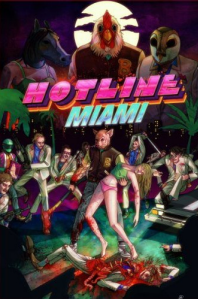By Joel Smart (The Cascade) – Email
Print Edition: November 7, 2012
Hotline Miami had just released on October 23, and the game was quickly becoming a hit among indie gamers. It’s bloody beat-em-up style combined with a retro top-down perspective gave the game a special flair that many couldn’t get enough of. Then, of course, the game wound up on The Pirate Bay, a torrent sharing website where some people share copyrighted music, movies and games. You’d expect that to be a major downfall for the game’s co-creator Jonatan Söderström, who was likely losing money (with many opting to play the game for free). Instead, he opted to head over to the site to offer advice and tips to those pirating his game.
In the comment section for the torrent of his game, Söderström explained who he was, how he hoped people would enjoy the game, and noted some suggestions to help people having problems play the game. “We’re working on an update that hopefully will take care of any/all bugs, and we’ll try to do some extra polish in the next few days,” part of the comment read. “Would be great if you could update the torrent when the patch is out! It’d be great if people get to play it without any bugs popping up.”
On his Twitter account, @cactusquid, Söderström clarified his position. “I don’t really want people to pirate Hotline Miami, but I understand if they do. I’ve been broke the last couple of months. It sucks.”
You’ve got to hand it to a struggling game creator who would still rather have players experience his game than to make as much money as possible from it. Hopefully those who play and enjoy the game will see his comments and realize that it’s worth supporting an indie developer – even if they don’t mind pirating the blockbuster games made by faceless corporations.
It’s actually possible that Söderström’s position could net him more sales than if he just shut down the torrent. According to Kotaku, that’s what happened when McPixel’s developer embraced the pirating of their game. Their position was such a PR boost—In a “Promo Bay” special, The Pirate Bay actually allowed downloaders to pay for the game after playing it—that the game actually made even more money.
For the head of Valve, Gabe Newell, developers should only fear piracy if the pirates offer a better product to the gamer. For him, DRM and always-online requirements of certain games designed to prevent piracy create a worse product for the gamer. For Newell, that’s the problem. “The best way to fight piracy is to create a service that people need,” he told Kotaku in an interview last year. “It’s a service issue, not a technology issue. Piracy is just not an issue for us.”
Newell, the mind behind Steam, is worth listening to on this one. PC gaming is perhaps the hardest hit by piracy, yet his service has captured the global gaming audience, and has unified the indie and blockbuster gaming industry in a way that no other service has. It’s easier and better to use Steam than to go out hunting for free versions – and regular sales and offers, free demos and a vibrant storefront make the service incredibly attractive for gamers. When Newell says he isn’t concerned by piracy, he means it.
Piracy can hurt certain developers though – especially small developers who put everything into their games, only to have sales lost due to free downloads. However, As Söderström and Newell point out, it’s not all bad. Sometimes it can increase awareness about a game; other times it can pressure studios to offer better services for their games. In the best case scenario, pirates will give what they can to the games that deserve it. If more pirates would go back and financially support the games that they enjoyed, the future of those like Söderström, and the future of the gaming industry as a whole, would be looking a whole lot brighter.


